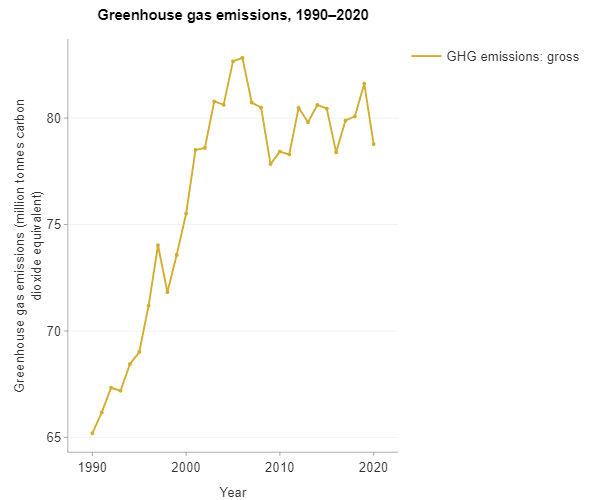As New Zealand transitions from the 2023 election period, a significant yet quieter transformation is unfolding within our environmental landscape. The country has achieved a significant decrease in annual carbon dioxide emissions resulting from the burning of fossil fuels. These emissions are now at their lowest level since 1999, and we are on track to meet our first carbon budget (2022-2025). This positive trend, which has persisted beyond the temporary effects of COVID-19 lockdowns, marks a crucial turning point in Aotearoa’s fight against the climate crisis.

Agriculture’s role in emission reduction
Agriculture is deeply woven into the fabric of New Zealand’s economy, contributing around 50% of the nation’s emissions. This figure is significantly higher compared to other developed countries, largely due to our reliance on agriculture and high renewable energy use. From 1990 to 2021, agricultural emissions rose by 13%, driven by an 88% increase in dairy cow numbers and a staggering 644% surge in synthetic nitrogen fertiliser use. Yet, recent trends indicate a shift towards a lower emissions agricultural model.
Celebrating agricultural advances
This shift in New Zealand’s agricultural sector is largely driven by the collective efforts between a diverse range of stakeholders, including policymakers, local catchment groups, and more. However, it’s crucial to spotlight the role of Science-Based Targets (SBTs) in guiding our agricultural sector toward achieving emissions reduction commitments. Below, we delve into the impactful changes occurring, a testament to the balance of environmental responsibility and agricultural advancement.
Global and local food producers aligning with the Paris Agreement
Recognising the urgency of climate action, leading food producers including global giants like McDonald’s, Tesco, Danone, Nestlé, and New Zealand’s trailblazers Fonterra, Synlait, and Silver Fern Farms are committing to SBTs. These targets aim to reduce emissions to a level that will curb the global temperature increase to below 2°C above pre-industrial levels. By focusing on reducing emissions across their operations and supply chains, these companies are not only setting a new standard for environmental responsibility. Still, they are also catalysing a widespread industry transformation.
McDonald’s and T&G Global’s SBT initiatives
McDonald’s has been at the forefront of adopting SBTs since 2018, demonstrating the potential for significant environmental impact in the fast-food industry. T&G Global, a major player in horticulture, has taken a noteworthy step by securing New Zealand’s first Sustainability-Linked Loan of $180 million with ANZ, linking financial incentives to emission targets. This approach marks a new chapter in sustainable financing and corporate responsibility.
Fonterra and Synlait’s ambitious climate roadmaps
Fonterra and Synlait are not just setting targets but are actively working towards achieving them. Fonterra’s Climate Roadmap, with its ambitious target of a 30% reduction in emissions by 2030 and achieving net zero by 2050, showcases a comprehensive strategy encompassing improved feed quality, enhanced herd performance, exploration of cutting-edge technologies, and effective carbon sequestration methods. Similarly, Synlait’s commitment, particularly through FLAG SBTs, underscores the importance of a collaborative approach, engaging directly with farmers to measure and mitigate emissions throughout their supply chain.
While these targets sound ambitious research by the Biological Emissions Reference Group estimates that a blend of lower stocking rates and improved animal performance can reduce net emissions in various production systems by approximately 10%. Furthermore, research from New Zealand Agricultural Greenhouse Gas Research Centre (NZAGRC) has shown incorporating fodder rape in ruminant diets can proportionally reduce methane emissions – a 50% fodder rape diet can lead to a 15% reduction in emissions. Innovative farming practices are emerging to drive emission reductions.
Forest Lodge Orchard: A zero fossil fuel farming pioneer
EAS played an important role in the remarkable journey of Forest Lodge Orchard, led by Mike Casey, which stands as a potential first in the world for zero fossil fuel, 100% electric commercial farming. Rejecting conventional fossil-fuel-powered machinery, Mike Casey has boldly opted for electric alternatives. This decision not only represents a substantial reduction in emissions but also offers long-term financial savings. Following Mike’s example would set horticultural enterprises on a pathway to set and achieve SBTs.
The road ahead
As New Zealand’s agricultural sector strides forward on this path, these success stories stand as powerful testaments to what can be achieved. They serve as sources of inspiration, signaling a future where emissions reductions and agricultural prosperity coexist.
At Environmental Accounting Services, our commitment is to support the agricultural sector in setting, pursuing, and achieving SBTs, fostering an ecosystem where environmental stewardship and agricultural advancement are inextricably linked. The journey ahead is challenging but filled with opportunities for improvement, setting the stage for a sustainable and prosperous future.
For a deeper understanding of how we can assist you in developing your FLAG target, visit https://enviroaccounts.com/science-based-targets/.

